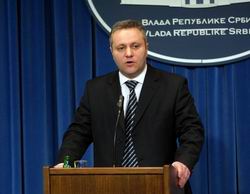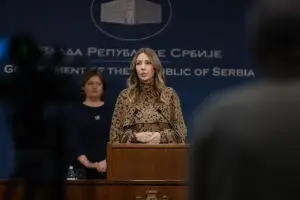Q:
A:
Public finance to stimulate economic growth
Belgrade,
10 March 2004
The main goal of the Serbian Ministry of Finance, headed by Minister Mladjan Dinkic, will be to use public finance for stimulating economic growth, which entails the adoption of new tax legislation, reduction of the existing tax rates, the abolishment of certain taxes and simplification of tax procedures, all with the aim of improving conditions for economic activities.
The new Minister of Finance held his first press conference today to present the Ministry's priorities, plans and goals for the first 100 days in office, as well as his new team.
Dinkic said that on March 3, 2004, €212 million were found in the Serbian budget, with last year's privatisation revenues accounting for €202 million of the sum and kept in the National Bank of Serbia in hard currencies. Of this sum, €160 million is available for spending, ie for the budget needs. The remaining €42 million belongs to the Restitution Fund, and will be used following the adoption of a law on denationalisation.
Dinkic said that the remaining €10 million (736 million dinars) were found in Serbia's budget itself.
At the end of 2003, Serbia's internal and external debt stood at €12.6 billion, which is 73 percent of the gross domestic product (GDP), the Minister said. He said that the debt will be serviced in the course of the year. Dinkic explained that €413 million will be set aside from the budget for servicing the public debt, of which €213 million will be earmarked for the payment of frozen hard currency savings. He said that the payment will begin on May 31, in accordance with the law, and that depositors of the Jugobanka Bank from Kosovska Mitrovica will receive their payments for the first time.
Dinkic said that the Ministry will settle its obligations in a timely manner, adding that the funds for pension payment, scheduled for March 24, have been secured, with a 12.2 percent rise in pensions in line with a quarterly adjustment with salaries.
Speaking about the goals of the Ministry, Dinkic said that public finances have helped secure macroeconomic stability so far. Now that macroeconomic stability has been achieved, public finances should be used to stimulate economic growth. He added that such a policy could be the driving force behind the economic development, which must be encouraged since Serbia is in recession.
The second goal of the Ministry is to develop the capital market and cut interest rates. Dinkic said that the annual interest rate of 23 percent on Treasury bills is unacceptably high concerning the fact that these are the safest securities in the country and are used for covering budgetary deficit.
"In the upcoming months, we will try hard to develop the capital market and trim interest rates. Securities should not only be sold to banks and through brokers. We want to simplify their distribution and expand the circle of beneficiaries," Dinkic said, adding that these measures will slash interest rates on bank loans.
Dinkic said that the Ministry will work to develop mechanisms for securing bank loan insurance, especially for the development of small and medium-sized enterprises.
The third goal of the Ministry will be the introduction of loan insurance in the fields of agriculture, housing, export activities and for underdeveloped regions.
The fourth goal is to modernise and boost the efficiency of inspection services that are under the Ministry's jurisdiction, including the tax administration office, the customs office, the directorate for prevention of money laundering, the hard currency inspectorate and the budgetary inspection service.
Personnel changes in some of these services will be undertaken with the aim of increasing their efficiency.
The Minister said that the key element in the reduction of grey economy will be the modification of tax legislation and the reduction of tax rates. This will be followed by strict supervision, which is possible to carry out only with an efficient tax administration office, customs office, the foreign currency inspectorate and the directorate for prevention of money laundering.
The Ministry's major task in the first 100 days of work will be to pass a new budget law for 2004, said Dinkic, adding that the new budget will be development-oriented. Noting that a budget proposal will be forwarded to the government by the end of next week, Dinkic said he expects the parliament to approve the new spending plan by the end of March.
Dinkic also presented a list of 17 bills which the Ministry plans to propose in the first 100 days of its work. The bills will be submitted to the parliament in two waves, the Minister went on to say, adding that the first part of the proposed legislation will be debated after the new budget is adopted, with the rest of the bills to be put on the parliament agenda by the end of the 100-day period.
The first wave includes a bill on value-added tax (VAT) which should take effect on Jan 1, 2005, Dinkic said. He stressed that the bill should be approved in the shortest period possible so as to prepare the grounds for its enforcement and train not only taxpayers but also the tax authorities. Experience of other countries shows that it takes at least six months to create the conditions for introducing VAT, which the Minister said will not exceed 18 percent, down from the initially planned 20 percent.
The second package of laws to be changed targets reduced icome tax, Dinkic added.
Noting that Serbia cannot kick-start its economic growth for privatisation receipts alone, the Minister said that the country needs greenfield investment. In order to attract investors that are leaving the South East European countries which are scheduled to join the European Union in May this year, Serbia must have a competitive edge over other EU hopefuls, he said.
Serbia's tax system is only one segment that has a role in attracting foreign investment. The Ministry will make efforts to trim personal income tax by a third, a plan which Dinkic described as the Ministry's most radical move this year.
A lack of fiscal revenues that will come as a result of reduced income tax will be compensated from taxes on games of chance, he explained, adding that the government will also propose a law to regulate games of chance which are currently untaxed.
The Minister said that a law on repaying the state's debt to citizens who lent their money for Serbia's economic recovery in the late 1980s will also be placed on the parliament agenda as part of the Ministry's first 100-day period.
Dinkic went on to announce a law on insurance, as well as the setting-up of an agency for monitoring insurance companies whose work will be brought up to European standards.
A new law on national corporation for housing loan insurance and a law on changes and amendments to the law on guarantee fund will have a more aggressive approach to bank loan insurance, said Dinkic, adding that the state will also provide insurance for agriculture lending and insure loans for underdeveloped areas.
The remaining 11 bills that the Ministry plans to propose in the first 100 days of work include a bill that will replace the law on financial transactions and a bill to replace the law on payroll taxes. The package also includes laws on changes and amendments to the laws on excise goods, property taxes, income taxes, corporate profit taxes, public revenues and spending, as well as a new bill on compulsory insurance contributions, and a law on amendments to the law on turnover tax.
The Ministry also plans to scrap some taxes during its first 100 days in office. Financial transaction tax will be immediately abolished in certain sectors and cancelled altogether in 2005. Other taxes to be abolished right away include taxes on heating and engine oils, lubricants, agribusiness, non-alcoholic beverages, and capital gains.
Dinkic recalled that March 15 has been set as the deadline for citizens who earned more than 867,255 dinars in 2003 to file their income tax returns, stressing that tax authorities have registered some 18,500 citizens with taxable income in Serbia.
The Minister also said he will ask the government to push back the deadline for fiscal cash register introduction and explained that a number of retailers have failed to meet the Feb 28 deadline due to delays in the establishment of the new government. Noting that there is a low supply of cash registers in the market, Dinkic added that the Ministry will also propose that the government issue cash register sale licenses to more firms.
Dinkic also named his team which includes Deputy Minister Vesna Arsic, a former vice-governor in the National Bank of Serbia, and Ministry Secretary Vesna Kovac, a former secretary-general of the Serbian central bank. Vesna Dzinic, who worker with Societe Generale, in the Assistant Minister in charge of treasury, Goran Andjelic is the Assistant Minister in charge of finance, and Nebojsa Skoric the new Assistant Minister charged with property. Vladimir Ilic will head the tax administration office.
Noting that the government will elect a new customs administration director and another assistant minister of finance at a session on Thursday, Dinkic stressed that strengthening the Ministry's organisation and personnel will be among his priorities.
Dinkic said that on March 3, 2004, €212 million were found in the Serbian budget, with last year's privatisation revenues accounting for €202 million of the sum and kept in the National Bank of Serbia in hard currencies. Of this sum, €160 million is available for spending, ie for the budget needs. The remaining €42 million belongs to the Restitution Fund, and will be used following the adoption of a law on denationalisation.
Dinkic said that the remaining €10 million (736 million dinars) were found in Serbia's budget itself.
At the end of 2003, Serbia's internal and external debt stood at €12.6 billion, which is 73 percent of the gross domestic product (GDP), the Minister said. He said that the debt will be serviced in the course of the year. Dinkic explained that €413 million will be set aside from the budget for servicing the public debt, of which €213 million will be earmarked for the payment of frozen hard currency savings. He said that the payment will begin on May 31, in accordance with the law, and that depositors of the Jugobanka Bank from Kosovska Mitrovica will receive their payments for the first time.
Dinkic said that the Ministry will settle its obligations in a timely manner, adding that the funds for pension payment, scheduled for March 24, have been secured, with a 12.2 percent rise in pensions in line with a quarterly adjustment with salaries.
Speaking about the goals of the Ministry, Dinkic said that public finances have helped secure macroeconomic stability so far. Now that macroeconomic stability has been achieved, public finances should be used to stimulate economic growth. He added that such a policy could be the driving force behind the economic development, which must be encouraged since Serbia is in recession.
The second goal of the Ministry is to develop the capital market and cut interest rates. Dinkic said that the annual interest rate of 23 percent on Treasury bills is unacceptably high concerning the fact that these are the safest securities in the country and are used for covering budgetary deficit.
"In the upcoming months, we will try hard to develop the capital market and trim interest rates. Securities should not only be sold to banks and through brokers. We want to simplify their distribution and expand the circle of beneficiaries," Dinkic said, adding that these measures will slash interest rates on bank loans.
Dinkic said that the Ministry will work to develop mechanisms for securing bank loan insurance, especially for the development of small and medium-sized enterprises.
The third goal of the Ministry will be the introduction of loan insurance in the fields of agriculture, housing, export activities and for underdeveloped regions.
The fourth goal is to modernise and boost the efficiency of inspection services that are under the Ministry's jurisdiction, including the tax administration office, the customs office, the directorate for prevention of money laundering, the hard currency inspectorate and the budgetary inspection service.
Personnel changes in some of these services will be undertaken with the aim of increasing their efficiency.
The Minister said that the key element in the reduction of grey economy will be the modification of tax legislation and the reduction of tax rates. This will be followed by strict supervision, which is possible to carry out only with an efficient tax administration office, customs office, the foreign currency inspectorate and the directorate for prevention of money laundering.
The Ministry's major task in the first 100 days of work will be to pass a new budget law for 2004, said Dinkic, adding that the new budget will be development-oriented. Noting that a budget proposal will be forwarded to the government by the end of next week, Dinkic said he expects the parliament to approve the new spending plan by the end of March.
Dinkic also presented a list of 17 bills which the Ministry plans to propose in the first 100 days of its work. The bills will be submitted to the parliament in two waves, the Minister went on to say, adding that the first part of the proposed legislation will be debated after the new budget is adopted, with the rest of the bills to be put on the parliament agenda by the end of the 100-day period.
The first wave includes a bill on value-added tax (VAT) which should take effect on Jan 1, 2005, Dinkic said. He stressed that the bill should be approved in the shortest period possible so as to prepare the grounds for its enforcement and train not only taxpayers but also the tax authorities. Experience of other countries shows that it takes at least six months to create the conditions for introducing VAT, which the Minister said will not exceed 18 percent, down from the initially planned 20 percent.
The second package of laws to be changed targets reduced icome tax, Dinkic added.
Noting that Serbia cannot kick-start its economic growth for privatisation receipts alone, the Minister said that the country needs greenfield investment. In order to attract investors that are leaving the South East European countries which are scheduled to join the European Union in May this year, Serbia must have a competitive edge over other EU hopefuls, he said.
Serbia's tax system is only one segment that has a role in attracting foreign investment. The Ministry will make efforts to trim personal income tax by a third, a plan which Dinkic described as the Ministry's most radical move this year.
A lack of fiscal revenues that will come as a result of reduced income tax will be compensated from taxes on games of chance, he explained, adding that the government will also propose a law to regulate games of chance which are currently untaxed.
The Minister said that a law on repaying the state's debt to citizens who lent their money for Serbia's economic recovery in the late 1980s will also be placed on the parliament agenda as part of the Ministry's first 100-day period.
Dinkic went on to announce a law on insurance, as well as the setting-up of an agency for monitoring insurance companies whose work will be brought up to European standards.
A new law on national corporation for housing loan insurance and a law on changes and amendments to the law on guarantee fund will have a more aggressive approach to bank loan insurance, said Dinkic, adding that the state will also provide insurance for agriculture lending and insure loans for underdeveloped areas.
The remaining 11 bills that the Ministry plans to propose in the first 100 days of work include a bill that will replace the law on financial transactions and a bill to replace the law on payroll taxes. The package also includes laws on changes and amendments to the laws on excise goods, property taxes, income taxes, corporate profit taxes, public revenues and spending, as well as a new bill on compulsory insurance contributions, and a law on amendments to the law on turnover tax.
The Ministry also plans to scrap some taxes during its first 100 days in office. Financial transaction tax will be immediately abolished in certain sectors and cancelled altogether in 2005. Other taxes to be abolished right away include taxes on heating and engine oils, lubricants, agribusiness, non-alcoholic beverages, and capital gains.
Dinkic recalled that March 15 has been set as the deadline for citizens who earned more than 867,255 dinars in 2003 to file their income tax returns, stressing that tax authorities have registered some 18,500 citizens with taxable income in Serbia.
The Minister also said he will ask the government to push back the deadline for fiscal cash register introduction and explained that a number of retailers have failed to meet the Feb 28 deadline due to delays in the establishment of the new government. Noting that there is a low supply of cash registers in the market, Dinkic added that the Ministry will also propose that the government issue cash register sale licenses to more firms.
Dinkic also named his team which includes Deputy Minister Vesna Arsic, a former vice-governor in the National Bank of Serbia, and Ministry Secretary Vesna Kovac, a former secretary-general of the Serbian central bank. Vesna Dzinic, who worker with Societe Generale, in the Assistant Minister in charge of treasury, Goran Andjelic is the Assistant Minister in charge of finance, and Nebojsa Skoric the new Assistant Minister charged with property. Vladimir Ilic will head the tax administration office.
Noting that the government will elect a new customs administration director and another assistant minister of finance at a session on Thursday, Dinkic stressed that strengthening the Ministry's organisation and personnel will be among his priorities.











